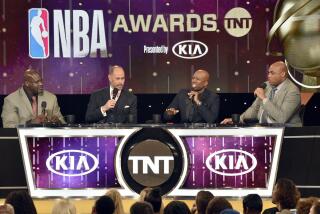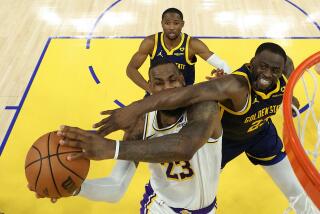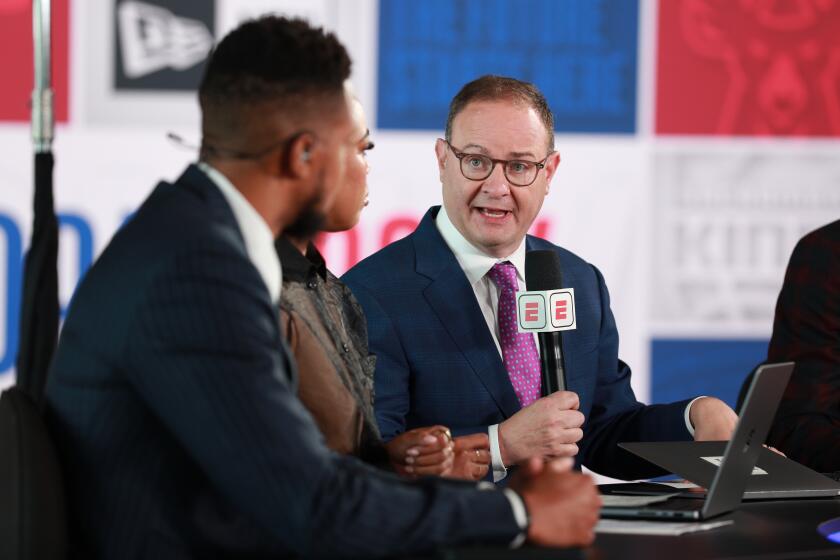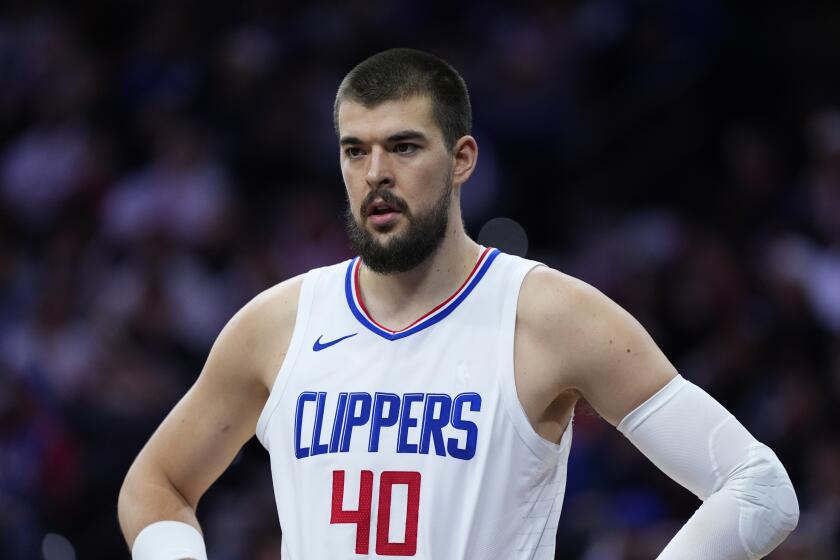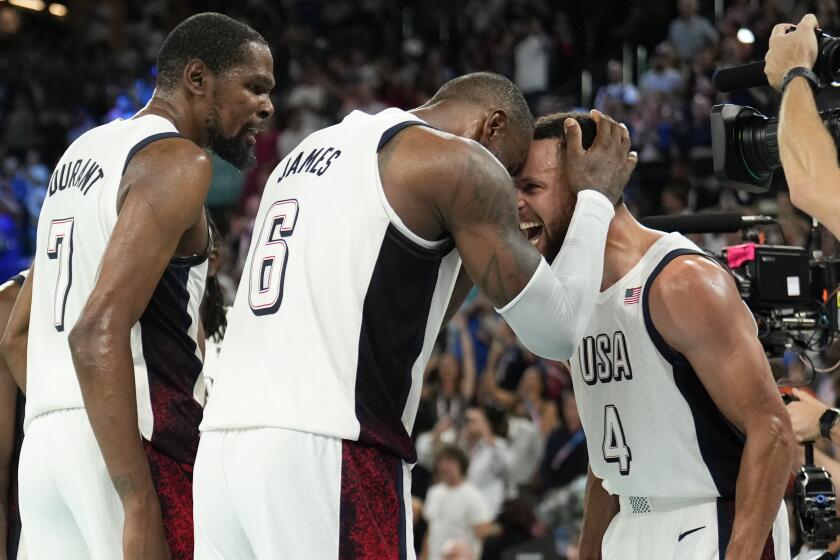Donald Sterling’s antitrust suit against NBA adds new wrinkle to saga
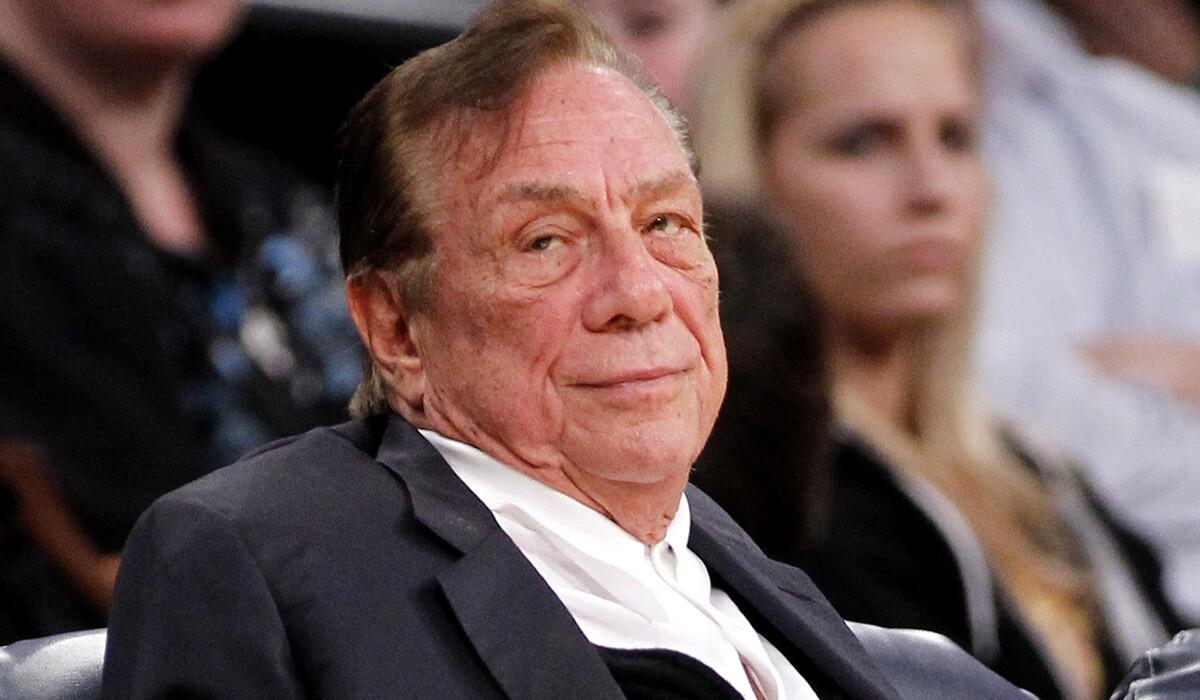
Minutes before the NBA announced a settlement with Shelly Sterling on Friday afternoon to sell the Clippers, co-owner Donald Sterling provided another twist in the monthlong drama surrounding the franchise.
Sterling filed an antitrust lawsuit against the NBA and Commissioner Adam Silver in U.S. District Court in Los Angeles, seeking more than $1 billion in damages.
The 14-page complaint criticized the league’s handling of Sterling’s $2.5-million fine, lifetime ban and move to terminate his ownership after his inflammatory remarks about African Americans were made public. In language echoing Sterling’s official response to the NBA’s contentions, it said the recording that resulted in the allegations against him was made illegally and in violation of his right to privacy.
“The punishment is capricious, arbitrary, unreasonable, and grossly discriminatory compared with similar ‘speech’ offenses,” the complaint said. “Sterling’s punishment is far and away the most severe ever imposed by an NBA commissioner for any conduct.”
The lawsuit demanded that Sterling’s ban and fine be revoked, the termination proceedings ended and Clippers President Andy Roeser, placed on an indefinite leave of absence by the NBA this month, be restored and that interim chief executive Dick Parsons be ousted.
“Mr. Sterling’s lawsuit is predictable, but entirely baseless,” NBA general counsel Rick Buchanan said.
In another example of the confusing developments that have become routine in this saga, the Sterling Family Trust is a plaintiff in the lawsuit. The Sterlings jointly own the team in the trust. But the headline on the NBA’s statement about Friday’s agreement with Shelly Sterling read: “NBA and Sterling Family Trust announce settlement.”
Shelly Sterling has made herself the lone trustee with sole control of the team, people familiar with the situation said, after doctors who examined her husband this month concluded he wasn’t able to engage in normal business affairs. Donald Sterling’s attorney, Maxwell Blecher, called that assertion “absurd.”
But the accord between the NBA and Sterling’s wife to stop the termination proceedings and allow the franchise to be sold to Steve Ballmer for a record $2 billion may undermine much of the case, according to Gabe Feldman, director of the sports law program at Tulane University.
“If Donald Sterling doesn’t voluntarily dismiss the lawsuit, then the NBA will file a motion to dismiss because there’s absolutely no claim here,” Feldman said. “I wish I could find a word to describe how strange it is. We’ve gone from uncharted territory to ludicrous territory at this point.”
The NBA’s position is the sale was not forced so Sterling’s antitrust claims have no merit.
“Mr. Sterling is complaining about a set of facts that don’t exist,” Buchanan said.
The key word in the NBA’s 109-word statement was Shelly Sterling’s agreement to “indemnify” the league against litigation, including by her husband.
If Donald Sterling proceeds with his lawsuit, he would essentially be suing his wife and the Sterling Family Trust, according to a person familiar with the sale agreement. Shelly Sterling and the Trust would then be obligated to cover any legal fees and losses incurred by the NBA.
Much of the complaint focuses on the termination hearing and Sterling’s concerns over being forced to sell the franchise. But after the NBA accepted the sale of the team to Ballmer, it canceled Tuesday’s hearing in New York. Ballmer still needs to be approved by three-quarters of the league’s 30 owners. No date has been announced for the vote.
Cited in the complaint is a May 22 letter from one of Sterling’s attorneys, Douglas Walton, to the NBA. It authorized Shelly Sterling to negotiate the franchise’s sale and said Donald Sterling “agrees to his sale of his interest” in the Clippers. Sterling does not dispute the contents of the letter.
What could be at issue is whether the sale was considered forced.
The lawsuit makes reference to Ballmer’s bid but doesn’t indicate the sale was made under duress, and that could have tax consequences.
Under Section 1033 of the federal tax code, people who sell property “compulsorily or involuntarily” can be exempt from capital gains tax if they use the profits to replace what they were forced to sell. The “involuntary conversion” statute most often is used in cases of eminent domain, such as the government seizure of private land for a highway, school or other civic purpose.
Some might read it that the Sterlings could avoid paying capital gains tax on the $2-billion sale.
“Certainly the sale is not something that [the Sterlings] are voluntarily undertaking,” said Sacramento tax attorney Douglas Youmans, former chair of the state bar’s taxation section. “Arguably it is some sort of taking. Whether or not it is a taking in the way the [Internal Revenue] Service would look at it…is what the issue is.”
Without an exemption, Donald Sterling, who bought the team in 1981 for $12.5 million, and his wife would be on the hook for what Blecher, has estimated as $300 million to $500 million in capital gains tax.
Blecher represented Donald Sterling against the NBA when he moved the Clippers from San Diego to Los Angeles in 1984. An out-of-court settlement was reached in 1987 in which the Clippers remained in Los Angeles in exchange for $5.7 million, its share of expansion revenue from four teams added to the league.
Friday’s developments, though, left some observers wondering what’s going to happen next.
“There are so many twists and turns with this thing,” said Mike Kretzmer, a Manhattan Beach attorney specializing in family law. Donald Sterling “signs the team over to Shelly and the next thing he’s doing something different. I’m beginning to wonder what his thought process is.”
Times staff writers Andrea Chang, Victoria Kim and James Rainey contributed to this report.
More to Read
Get our high school sports newsletter
Prep Rally is devoted to the SoCal high school sports experience, bringing you scores, stories and a behind-the-scenes look at what makes prep sports so popular.
You may occasionally receive promotional content from the Los Angeles Times.
